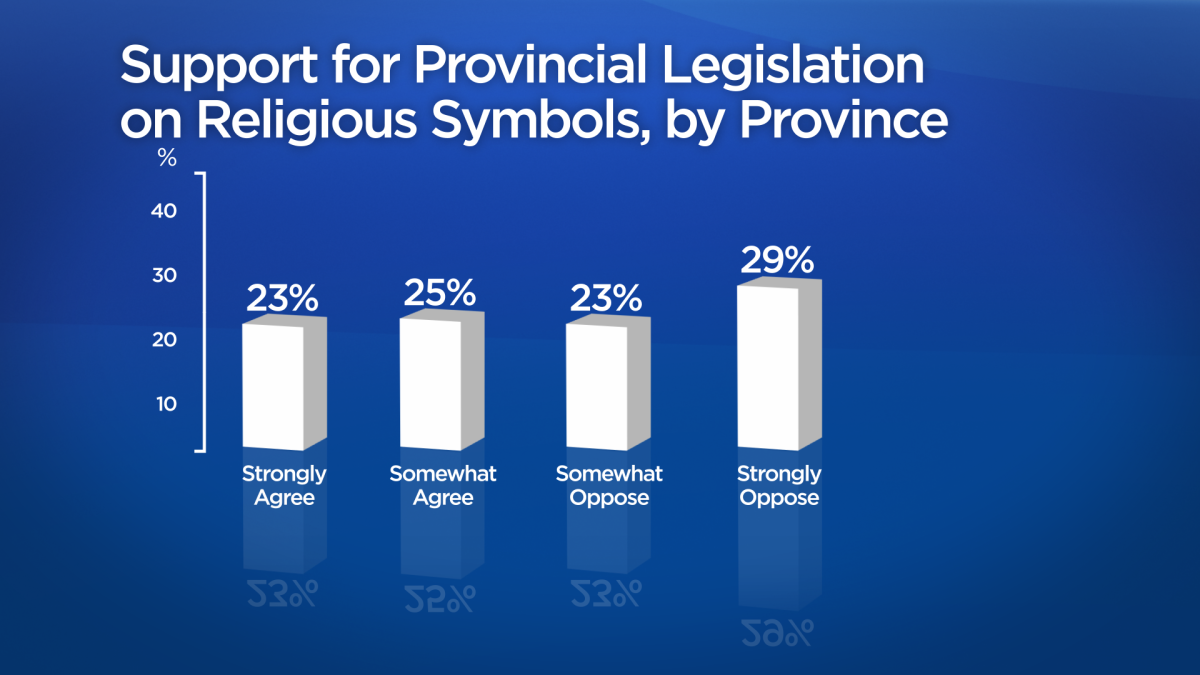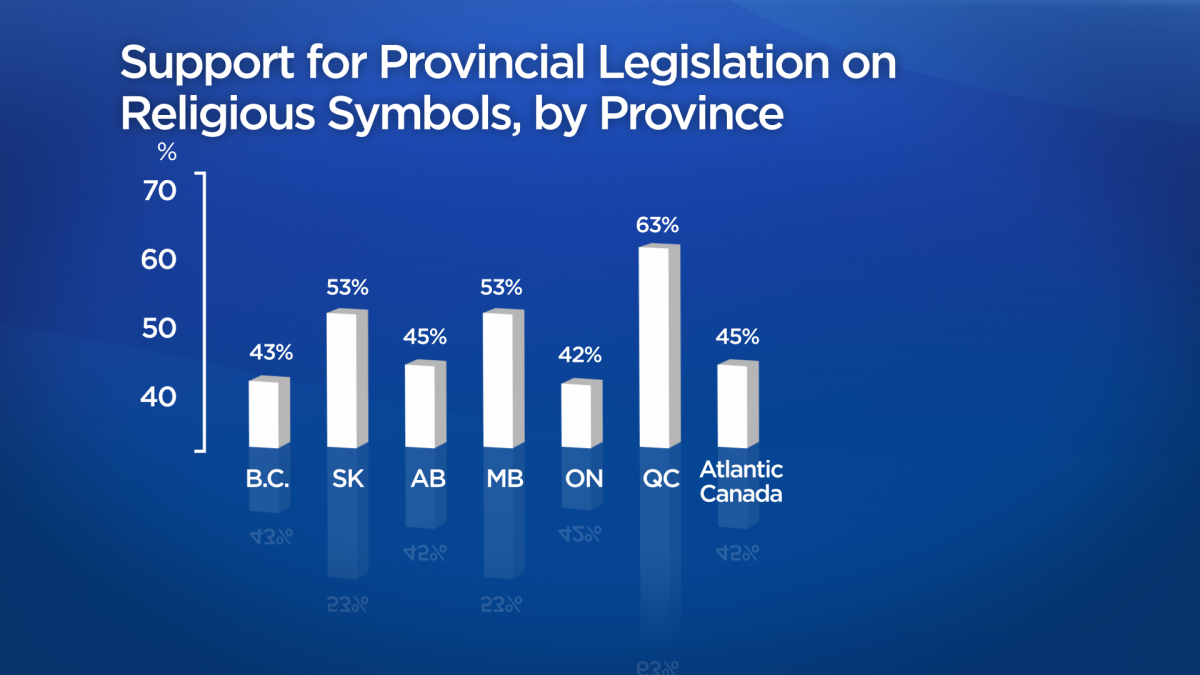About one week into the federal election campaign, leaders have been repeatedly pushed on their positions regarding Quebec’s Bill 21.

But a recent poll conducted exclusively for Global News by Ipsos found that Canadians themselves are split on the law, which bans religious symbols for some public-sector employees.
Fifty-two per cent of Canadians said they would oppose a bill that would restrict or disallow religious clothing or gear — such as a crucifix, turban or hijab — for public servants such as police officers, teachers and lawyers.
That leaves 48 per cent of Canadians who would either support or somewhat support such a law.
The poll is in line with previous polls, which show such rules are particularly popular within Quebec.
According to the latest findings, 63 per cent of Quebecers support Bill 21. Support for the bill is second highest in Saskatchewan and Manitoba (53 per cent), followed by Alberta and Atlantic Canada (45 per cent), British Columbia (43 per cent) and Ontario (42 per cent).
Among decided voters, support for the bill was highest among Bloc Québécois voters, followed by supporters of the People’s Party of Canada and the Conservative Party — at 85 per cent, 76 per cent and 62 per cent, respectively.
Support was lower among decided Liberal voters at 39 per cent and NDP and Green Party voters at 35 per cent each.
WATCH: Scheer talks Quebec’s Bill 21 as federal election campaign begins

Major federal leaders, including the Liberals’ Justin Trudeau, the Conservatives’ Andrew Scheer, New Democrat Jagmeet Singh and the Green Party’s Elizabeth May, have all spoken out against the law.
Yet, none have committed to challenging the provincial law themselves.

Get breaking National news
This has resulted in criticism from those who have been pushing for the federal government to take a stronger stance against the law.
Balpreet Singh of the World Sikh Organization of Canada (WSO) told Global News he’s “absolutely shocked” the law has not prompted outrage across the country.
“I am absolutely shocked that the fact people are being banned from work because of their religion in Canada is not a national crisis.”
He continued: “It baffles me that we are supposed to be leaders on human rights.”
Singh noted that the law may be one created within provincial borders, but it affects all Canadians.
“If a provincial government can curtail human rights for a small group of racialized individuals then that sets a precedent,” said Singh, who is the legal counsel for the WSO.
“So, if tomorrow, a provincial government wants to use the notwithstanding clause to clamp down on a racialized group or the LGBTQ community, what will we do then?”
Bill 21 was adopted in June and invokes the notwithstanding clause of the Canadian Constitution, which prevents citizens from challenging the law for violating fundamental rights and liberties protected by the Canadian Charter of Rights and Freedoms.
In August, the Sikh group decided to officially intervene in a court challenge launched by the National Council of Canadian Muslims, the Canadian Civil Liberties Association and a university student named Ichrak Nourel Hak, who wears a hijab.
Lawyers challenging the bill did so on grounds rooted outside the charter. They argued the law is unconstitutional because it encroaches on federal jurisdiction, is impermissibly vague and violates citizens’ rights to participate in their democratic institutions.
Federal leaders who oppose the law have all said they will not intercede while the court challenge plays out.
WATCH: My presence in Quebec ‘is an act of defiance’ against Quebec Bill 21, Singh says

Scheer and Singh have both denied the possibility of stepping in, while Trudeau has left the door open.
On Friday, Trudeau told reporters: “We are not closing the door to a possible intervention because it would be irresponsible for a federal government to choose to shut the door on a matter of fundamental rights.”
Two days prior to that, Scheer left the legal challenge to the courts.
“People who are against this bill right now are making that case directly in the courts. That is their right, they will have the ability to do so, and the courts will ultimately decide on that. For our part, we will not proceed with this type of initiative at the federal level we don’t believe that this is something we would ever do at the federal level,” he said.
Asked a similar question over the weekend, Singh replied: “The folks that are bringing that forward, it’s their court challenge, and it would not be appropriate to interfere with their court challenge.”
May has also not said whether she would support a legal challenge to the bill. The Bloc Québécois and the People’s Party of Canada have voiced support for Bill 21.
Stéphanie Plante, who works at the University of Ottawa’s Centre for Interdisciplinary Research on Citizenship and Minorities, told Global News that federal leaders are unlikely to offer anything more detailed than these statements during the election campaign.
“Any party leader — whether you are Boris Johnson, whether you’re Donald Trump or whether you’re these three guys — they want to project themselves in a leadership role and not necessarily get into the nitty-gritty of policy details,” Plante said.
WATCH: Singh says he’s opposed to Bill 21, but focused on tackling climate crisis, health care

Plante said the leaders are more likely to make broad statements on Bill 21 but also a range of other topics, such as climate change, the economy and national security.
Leaders are especially careful to get into controversial provincial issues during election time, she noted, pointing to Alberta’s oilsands as another example.
Plante noted that more detailed discussions on Quebec’s law are likely to happen after the election is over — partly because leaders will have to keep track of what happens with the court challenge.
But that’s not good enough for some advocates, including Amira Elghawaby of the Canadian Anti-Hate Network, who said she was hoping federal leaders would be less calculated in denouncing the law.
“It’s a very sad day in Canada when our federal leaders are making those types of calculations and deciding not to speak up for the Charter of Rights and Freedoms,” she said.
Beyond Bill 21, Elghawaby noted that Canada has “come quite far” in terms of having conversations about issues such as reconciliation, anti-Semitism and racism. She said not addressing Quebec’s ban on religious symbols could have larger implications.
“We hurt the wider society once we start preventing people from participating. We are limiting our potential as a country, both economically and socially.”
For the raw data of the Ipsos poll, visit Ipsosintelligence.ca.










Comments
Want to discuss? Please read our Commenting Policy first.